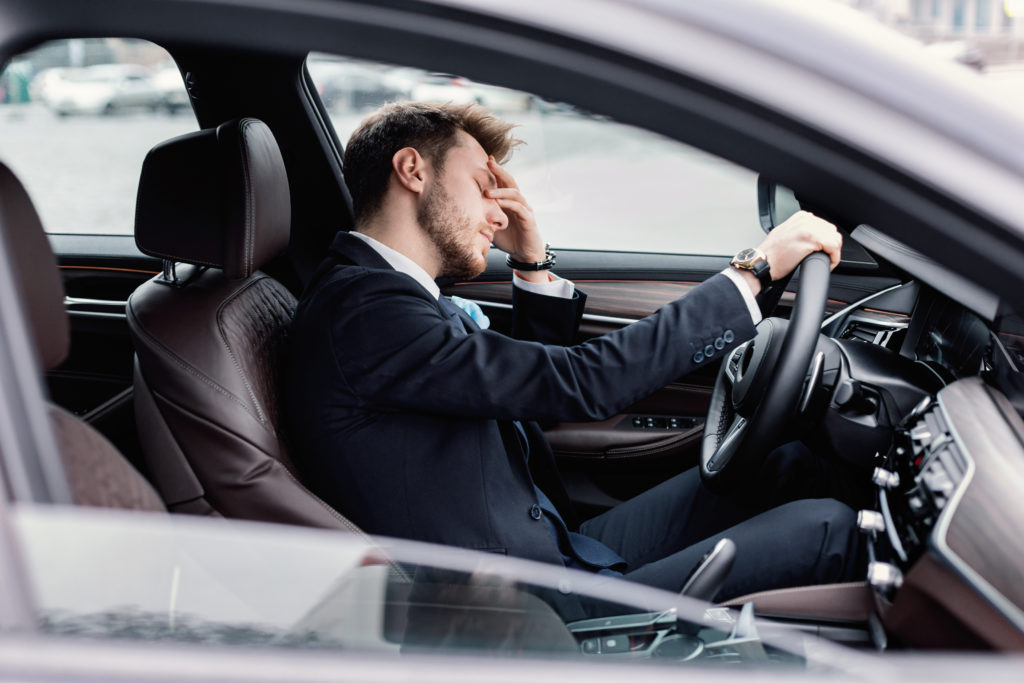We’re tired. Our lives are over-connected, busy, and sometimes messy. Our lives are either filled with the constant engagement of friends, family, coworkers and or filled with way too much time alone with our thoughts and unmet needs. Both are exhausting. We try to do it all! Whether you are trying to grow a family or racing around getting your kids to all their sports and school activities, or if you are in school and working full-time, or maybe you spend a lot of time and energy caring for an aging adult or loved one, it’s tiring. We’re tired. But you know what we are also doing? Driving tired.
Drowsy driving (driving tired) may sound innocent, but it’s not. Many people have heard the old wives’ tale that driving tired is worse than driving drunk, and more realistically both are terribly dangerous to you and all those around you. Drowsy driving is any time that you are not fully alert. Drowsy driving slows reaction times and the ability to have full awareness of what is going on around you. It could mean you are unable to stop at a stop sign or light, that you might nod off and miss an animal crossing the road, or that you could totally fall asleep letting your car potentially crash into others or go off the road into a telephone pole, lake or even into a home. Drowsy driving is dangerous driving and impaired driving.
If you think that driving drowsy isn’t a problem, don’t be so sure. The National Highway Traffic Safety Administration estimates that in 2017 drowsy driving was responsible for 91,000 crashes—resulting in 50,000 injuries and nearly 800 deaths. However, these numbers are underestimated, and up to 6,000 fatal crashes, each year may be caused by drowsy drivers. What’s scarier? The Centers for Disease Control shares that an estimated 1 in 25 adult drivers (aged 18 years or older) report having fallen asleep while driving in the previous 30 days.
If you are noticing that you are struggling to be alert at your driving times, you may need to adjust your sleep schedule, or even take a short nap before hitting the road. Shift workers and those who travel constantly for their employment are often working odd hours and not getting enough sleep. Keep in mind, caffeine and energy drinks should not be used as an insurance plan for safely driving alert. An untreated sleep disorder may also be the culprit for your drowsiness. Many people have sleep apnea and leave it untreated, or won’t adhere to their treatment plan, making them a danger on the road. There are other sleep disorders that can cause sudden drowsiness as well. If you are concerned about these, talk to your healthcare provider. North Country Hospital has its very own Sleep Medicine Department and Sleep Lab that can help diagnose and treat those underlying conditions. Ignoring your symptoms won’t make them go away or get better, but they could put you and others in danger.
Unfortunately “driving drowsy,” is left off many auto accident reports, but that doesn’t make the “accidents,” go away. Car accidents aren’t just about those involved in the vehicle. It takes the time and talents of first responders and many other professionals that now become responsible for cleaning up the mess. While a first responder is headed to your accident caused by drowsy driving, a father could be waiting for an ambulance from a heart attack, or an elderly lady who’s fallen could also be waiting for help. Drowsy driving accidents are careless, needless, and draining.
The impacts of driving drowsy are huge! The AAA Foundation for Traffic Safety estimated that drowsy driving accidents that result in injury or death cost our society over $109 billion annually. That’s not including property damage and/or medical bills. If you cause an accident, you may also be liable for an injured victim’s expenses. And the most expensive price, something that even the best insurance policy can’t buy – life. Drowsy drivers can kill people, and that’s not ok.
Together we can all help to keep our friends and neighbors safe, by driving safely. Being aware on the road, disconnected from cellphones and other distractions, and only getting behind the wheel sober and alert. It’s Drowsy Driving Prevention Week, start talking about it, and talk to your kids, friends, and family about it. Always remember that drowsy driving is impaired driving.
Mary Hoadley
Director of The Wellness Center


